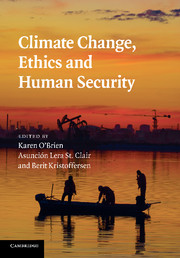Book contents
- Frontmatter
- Contents
- Contributors
- Foreword
- Preface
- Part I Framings
- Part II Equity
- Part III Ethics
- Part IV Reflexivity
- 9 Linking sustainable development with climate change adaptation and mitigation
- 10 Global poverty and climate change: towards the responsibility to protect
- 11 Social contracts in a changing climate: security of what and for whom?
- 12 Towards a new science on climate change
- Index
- References
11 - Social contracts in a changing climate: security of what and for whom?
Published online by Cambridge University Press: 01 June 2011
- Frontmatter
- Contents
- Contributors
- Foreword
- Preface
- Part I Framings
- Part II Equity
- Part III Ethics
- Part IV Reflexivity
- 9 Linking sustainable development with climate change adaptation and mitigation
- 10 Global poverty and climate change: towards the responsibility to protect
- 11 Social contracts in a changing climate: security of what and for whom?
- 12 Towards a new science on climate change
- Index
- References
Summary
Introduction
Climate change is exacerbating complex social–ecological changes that threaten the security of individuals and local communities around the world. The complexity and the sheer scale of the risks now associated with climate change has undermined the idea that any nation state, acting alone, can credibly claim to provide security for its citizens (Pelling and Dill, 2006, 2009; O'Brien, Hayward and Berkes, 2009). The global extent of climate change, with its diverse local manifestations, calls for rapid and comprehensive responses at all levels to reduce both greenhouse gas emissions and vulnerability to climate variability and change.
Given these challenges, is not surprising that there are urgent calls for new political solutions. A new ‘social contract’ is proposed by many as a way to organise a more effective, collective response to climate change. Individual politicians and non-governmental organisations alike have called for new agreements between citizens and the state to address the threats associated with climate change. For example, in 2006 David Miliband (then Environment Secretary in the UK), argued that a new ‘environmental contract’ is essential to clarifying the rights and responsibilities of citizens, businesses and nations to one another (Miliband, 2006). In 2008, members of the European Parliament called for a new ‘global contract’ for climate justice, to promote environmental effectiveness, avoid unduly harsh economic impacts and ‘shield the world's poor’ from the worst effects of climate change (Edenhofer et al., 2008).
- Type
- Chapter
- Information
- Climate Change, Ethics and Human Security , pp. 199 - 214Publisher: Cambridge University PressPrint publication year: 2010
References
- 2
- Cited by

